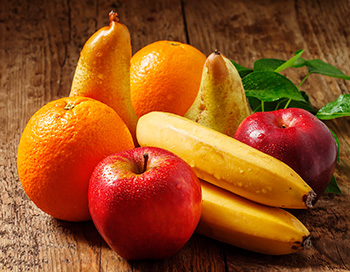More Health and Nutrition Bites
Related
Inflammation
Inflammation is the body's response to things that might cause damage: this might include dysfunctional cells, invading foreign agents (like a virus or a bacteria) or exposure to toxins. The purpose of inflammation is to attract immune cells to destroy the damaging invader and return the tissue to normal.
What are antioxidants?
When the cells in your body use oxygen, the interaction with other molecules results in their oxidation. The by-product of that oxidation is free radicals -- molecules or atoms that lose one or more electrons. Free radicals are unstable, and in a sense, are looking to replace or give up their unbalanced number of electrons. In scavenging for electrons, they cause damage to cells in the body. That is known as "oxidative stress" and this cellular damage contributes to disease.
Healthy snacking habits and skills start early
Parents are bombarded with messages about "starting your kids out right," and the areas of diet and exercise are no exception. Not only is it important to make sure your child consumes the right foods to grow a healthy body, teaching them healthy habits, including healthy snacking, early will help them maintain that health for the long term.
Health & Nutrition Bites
Get the latest health and diet news - along with what you can do about it - sent to your Inbox once a week. Get Dr. Gourmet's Health and Nutrition Bites sent to you via email. Sign up now!
An apple a day may help keep the grim reaper away

Ten years ago (wow!) I wrote about research that focused on the flavonoids (a specific antioxidant) found in so many foods, from apples to chocolate. That research was done with a synthesis of multiple apple types, in vitro (in a test tube, not in humans or animals), and found that these flavonoids protected endothelial cells (the cells that line the inside of our blood vessels) from a substance known as Tumor Necrosis Factor, which is known to trigger inflammation. (Here's an article I wrote about how inflammation impacts the body.)
It's those antioxidants, including Vitamin C, that are thought to be part of the reason why fruit and vegetable consumption is so important, but we have also seen that the amount and type of fiber fruits contain may reduce the risk of death from any cause.
Now a team of researchers in Australia have looked specifically at apple consumption (Brit J Nutr 2016;115:860-867). As part of a larger, 5-year study focusing on the impact of calcium supplements to prevent bone fractures, nearly 1,500 women over 70 years of age chose to participate in two extended followup studies of 5 years each, bringing the total followup time to about 15 years. Along with medical and demographic evaluations, the participants responded to detailed dietary questionnaires at the start of the original study and again after 5, 7, and 10 years. This allowed the authors to evaluate their overall fruit intake, including the specifics of their consumption of apples, bananas, pears, and citrus fruits (including oranges).
The participants' intake of these fruits remained remarkably consistent over the years, which lends strength to the overall results: those women who averaged eating just half a small apple a day, as compared to those women who ate fewer than 20 apples per year, were 35% less likely to die of any cause and 55% less likely to die of cancer. This association took into account the amount of flavonoids, total fiber, Vitamin C, and magnesium the women consumed through the rest of their diet.
Interestingly, only bananas came close to matching the reduction in risk of death from cancer, while overall fruit intake seemed to be more strongly related to a reduction in risk of death from heart diseases.
What this means for you
As always, this is an observational study, meaning the results are correlation - we can't claim solely from this study that apples in and of themselves prevent cancer or any other illness. Take this to be yet another reason to make fruit your regular snack or dessert of choice (and no, that doesn't mean you should eat apple pie every day). Whether it's apples, pears, or any other fruit, you're getting great antioxidants, fiber, and other vitamins - and they're satisfying.
First posted: May 25 2016
